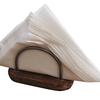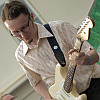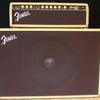ncgalt1984

Joined: Nov 27, 2013
Posts: 235
Greenville, NC



|

Posted on Apr 16 2014 08:30 AM
I've looked through the forums and couldn't find this topic so please forgive me if this has been talked about elsewhere. I am trying to learn and understand modal scales and progressions so that I can add more variety to my playing/writting. Anyone have any suggestions? Has anyone learned any tricks that apply specifically to Surf Music?
For example, I've learned that songs that use a major tonic (the key of the song) and a major subtonic (the flattened 7th) are always in the mixolydian mode. Example: songs where the bass line bounces between G (the tonic) & F (the flattened 7th) like Jack the Ripper and Baja. Jack the Ripper is a great song to use as a backing track to practice the mixolydian scale, btw.
This isn't an uncommon rhythmic progression in instro-music so it's a good thing to know. Have you figured out any little "tricks" like that?
Kevin
— Kevin
The Out of Limits
www.facebook.com/theoutoflimitsband
https://theoutoflimits.bandcamp.com/
|
ElBirkerio

Joined: Dec 17, 2012
Posts: 519
Vienna




|

Posted on Apr 16 2014 08:37 AM
hi!
talk to a jazz guitarist ... the basics of the theory of harmony are not that complex. however, some classics (misirlou, exotic and journey to the stars come to my mind) are heptatonic ... that is a little bit different ...
yours wolfi
— http://www.surfgrammeln-san.org
https://www.facebook.com/BaluUndSurfgrammeln
http://greencookierecords.bandcamp.com/album/coming-out-soon-los-chicharrones-del-surf-10
|
Surf_Skater

Joined: Sep 06, 2012
Posts: 1300
Lawrenceville , GA


|

Posted on Apr 16 2014 09:00 AM
ncgalt1984 wrote:
Jack the Ripper is a great song to use as a backing track to practice the mixolydian scale, btw.
 I know I'm off topic but do you know where to find a good Jack the Ripper backing track? I love playing that song and have been looking for one for quite some time. I know I'm off topic but do you know where to find a good Jack the Ripper backing track? I love playing that song and have been looking for one for quite some time.
|
simoncoil

Joined: Sep 28, 2012
Posts: 926
Berlin, Germany





|

Posted on Apr 16 2014 09:26 AM
ncgalt1984 wrote:
For example, I've learned that songs that use a major tonic (the key of the song) and a major subtonic (the flattened 7th) are always in the mixolydian mode.
Sorry, but that is a bit misleading. Whether the first or the second chord is recognized as the tonic depends mostly on their metric position, i.e. two chords don't necessarily "make the impression" of a certain mode.
In your case: You have a mixolydian tonic, let's take G7 to keep it simple and want to make a chord progression (maybe because you think one-chord-songs are too boring  ). Following your implication that could be Fmaj7 and as long as the progression is something like this, you're going to be okay: G7 G7 Fmaj7 G7 - because the emphasis is on the tonic. ). Following your implication that could be Fmaj7 and as long as the progression is something like this, you're going to be okay: G7 G7 Fmaj7 G7 - because the emphasis is on the tonic.
However if you take the same chords and line them up in another way, for example: G7 Fmaj7 G7 Fmaj7 - it will be harder to make out which is the tonic. And then when you put the emphasis on the other chord this will become the tonic (i.e. lydian: Fmaj7 G7 Fmaj7 Fmaj7).
So two suggestions to help you manage your modes:
First, make a list for each mode that shows you the characteristics of the scale. For example: the mixolydian scale basically is the major scale but with a dominant seven:
1 2 3 4 5 6 b7 instead of
1 2 3 4 5 6 7.
Dorian on the other hand is a minor scale but with a major sixth, hence
1 2 b3 4 5 6 7 instead of
1 2 b3 4 5 b6 7 and so on.
You will discover that all modes can be understood as simple variations of either the minor or major scale.
As a second step look at the chords that can be built with the single scales (and always write them with extensions to keep your orientation). For example mixolydian incorporates the following chords:
(G A B C D E F )
I-7 II-m7 III-m7b5 IV-maj7 V-m7 VI-m7 VII-maj7
Some of these chords generate the urge to go back to the tonic (hence called dominant) others don't (hence subdominant). Play around with each scale and its chords to get used to them.
Modes are a very easy way to write music in my opinion since every one of them already evokes a certain mood.
— Los Apollos - cinematic surf music trio (Berlin)
"Postcards from the Scrapyard" Vol. 1, 2 & 3 NOW available on various platforms!
"Chaos at the Lobster Lounge" available as LP and download on Surf Cookie Records!
Last edited: Apr 16, 2014 09:29:19
|
HallmarkSweptWinger

Joined: Jul 27, 2006
Posts: 1284
Berlinesia, Germanifornia


|

Posted on Apr 16 2014 09:54 AM
OMG!
I feel like a total idiot…
I do not know WHAT you are talking about at all…
This is total nonsense for me.
I just know that when you play guitar the melodies for new songs are rising from playing and feeling! I do not know theory of music but I always compose songs. I do not think about adding jazz chords just to get interesting music.
The melodies and good arrangements are NOT in any theory book. They are inside you! Or not…
— Twang cheers!
Ralf Kilauea
www.kilaueas.de
https://kilaueas.bandcamp.com/album/touch-my-alien
|
simoncoil

Joined: Sep 28, 2012
Posts: 926
Berlin, Germany





|

Posted on Apr 16 2014 10:13 AM
HallmarkSweptWinger wrote:
The melodies and good arrangements are NOT in any theory book. They are inside you! Or not…
Of course theory can never be a substitute for creativity. But it makes organising the process so much easier, for me anyway: You are right, I have the melody in my head first and need to get it out. And often it is simply frustrating (and time consuming) for me to sit down with the guitar and try to just "play it out", which means playing the first note and then adding the rest via trial and error till it sounds like I wanted it to be in the first place. So I usually work out some ideas on an abstract level first, which actually makes it easier for me to play them.
Another thing is that, when I write stuff by simply playing around I often find myself playing something I already have used in another song. I keep stuck with things I already know, which again is frustrating. But when I work things out in my head first, my hands are forced to go in different directions and I end up with much more interessting stuff.
Theories are tools, nothing more and nothing less. If you can get along without theory, the better for you!
— Los Apollos - cinematic surf music trio (Berlin)
"Postcards from the Scrapyard" Vol. 1, 2 & 3 NOW available on various platforms!
"Chaos at the Lobster Lounge" available as LP and download on Surf Cookie Records!
Last edited: Apr 16, 2014 10:14:15
|
togergo

Joined: Jan 23, 2012
Posts: 282
Budapest



|

Posted on Apr 16 2014 10:24 AM
Creative process /writing - improvising - etc/ and learning is two different thing. If you learn more, you'll have more material, when you start something creative stuff. You don't have to use it, your creativity will 
If you play blues pentaton through your life, and you're happy, it's ok, if you start to be bored... you need to learn something 
but to learn something in music doesn't mean: learn theory, you can follow theoretical pathes, but you have to 'learn with your ears' - if you want to be a - musically - richer musician. I hope, you understand what I want to say - my english isn't too good
— original compositions (low-level demo stuff /out of tune, etc) myStuff not my best, but i don't like to be in a musician community without anything to show
Last edited: Apr 16, 2014 10:25:28
|
ncgalt1984

Joined: Nov 27, 2013
Posts: 235
Greenville, NC



|

Posted on Apr 16 2014 11:16 AM
Thanks everyone. I am just starting to digest some of the stuff. I agree that theory is no substitute for creativity. However, I am a very "left-brain", "green-gold", or whatever you want to call it. I need to understand why things work the way they do. It's what I do whether I am working or playing. I'm not trying to get a degree in music theory. I just want some basic understanding and more tools in my bag of tricks.
— Kevin
The Out of Limits
www.facebook.com/theoutoflimitsband
https://theoutoflimits.bandcamp.com/
|
togergo

Joined: Jan 23, 2012
Posts: 282
Budapest



|

Posted on Apr 16 2014 11:25 AM
annoying music, but playing with - not just modal - scales is funny 
— original compositions (low-level demo stuff /out of tune, etc) myStuff not my best, but i don't like to be in a musician community without anything to show
|
ElBirkerio

Joined: Dec 17, 2012
Posts: 519
Vienna




|

Posted on Apr 16 2014 11:33 AM
hi!
the "inside yourself" thing is certainly important. still it helps alot to figure out a song, or to come up with additional ideas when you know some theory. i always found a phrase looper an amazing help when experimenting with song ideas, scales and stuff...
yours wolfi
— http://www.surfgrammeln-san.org
https://www.facebook.com/BaluUndSurfgrammeln
http://greencookierecords.bandcamp.com/album/coming-out-soon-los-chicharrones-del-surf-10
|
ncgalt1984

Joined: Nov 27, 2013
Posts: 235
Greenville, NC



|

Posted on Apr 16 2014 11:48 AM
Simon, I think I was trying to say the same thing you said; I was just way over-simplifying the way I said it. I may be wrong, though, because I understand this stuff just barely enough to be dangerous.
In a way though, the reason I started this thread is because I want to try to over-simplify it in a way. I was purposely making a generalization because I don't know that I will ever have the time to become an expert on this stuff. I'm interested in knowing if there are any safe "generalizations" when it comes to surf music. For example, if you have a song that is an Andalusian cadence (Walk Don't Run, Lullaby of The Leaves, Perfidia, etc) is there a particular mode that will "generally" work really well or a simply way to identify the tonic, etc. Just little tips or tricks that you've learned through your experience.
— Kevin
The Out of Limits
www.facebook.com/theoutoflimitsband
https://theoutoflimits.bandcamp.com/
Last edited: Apr 16, 2014 11:48:52
|
HallmarkSweptWinger

Joined: Jul 27, 2006
Posts: 1284
Berlinesia, Germanifornia


|

Posted on Apr 16 2014 01:27 PM
togergo wrote:
annoying music, but playing with - not just modal - scales is funny 
This is good. I learn this complete and use it in my next song.
…of course it is good when you know the theory of what you are doing. For me it is often a time problem… Sometimes I look for different scales and try to automatize them in me. But you have to do it every day! Then it works.
I once bought me a learning DVD for jazz guitar. Yes, I have to say it is good for my fingers to learn a bit different chords and tones. At last good for the brain. Sometimes I look at youtube "how to play … on guitar". So sometimes I learn a little bit from a Slayer song, the other day a little bit George Benson. I try not to be static.
— Twang cheers!
Ralf Kilauea
www.kilaueas.de
https://kilaueas.bandcamp.com/album/touch-my-alien
|
Badger

Joined: Nov 16, 2013
Posts: 4537
Wisconsin







|

Posted on Apr 16 2014 04:31 PM
Surf_Skater wrote:
ncgalt1984 wrote:
Jack the Ripper is a great song to use as a backing track to practice the mixolydian scale, btw.
 I know I'm off topic but do you know where to find a good Jack the Ripper backing track? I love playing that song and have been looking for one for quite some time. I know I'm off topic but do you know where to find a good Jack the Ripper backing track? I love playing that song and have been looking for one for quite some time.
There was that discussion here - perhaps Psychonaut still has it or can upload it to the download section. Would be a good addition for the site.
— Wes
SoCal ex-pat with a snow shovel
DISCLAIMER: The above is opinion/suggestion only & should not be used for mission planning/navigation, tweaking of instruments, beverage selection, or wardrobe choices.
|
RobC

Joined: Oct 11, 2010
Posts: 152
Bainbridge Island, Washington


|

Posted on Apr 16 2014 04:52 PM
Played by ear all my life which I could do quite easily but it was definitely a crutch. I learned basic theory and memorized all the modes and it was like taking a cast off my leg while running a marathon.
Huge difference. Just memorizing the modes was a huge leap in my playing and writing.
|
ncgalt1984

Joined: Nov 27, 2013
Posts: 235
Greenville, NC



|

Posted on Apr 16 2014 06:04 PM
I just spent 2 hours jamming the Mixolydian scale over a G Major Jam track on Youtube. Loads of fun. Mixing the Mixolydian with the Minor/Blues scale opens up a lot of combinations.
FYI, in case anyone was wondering, the reason I started this post here is because I am a huge fan of Tony Rice and I read in his autobiography that for Bluegrass the main things to know are the Major/Country, Minor/Blues, Dorian, and Mixolydian scales. I started messing around with Mixolydian last night and it got me to wondering about which scales are most common in Surf. The ones I see/use the most in Surf are Major and Minor/Blues when I am thinking in terms of scales. A lot of what I do on electric is by ear, though, as others have stated.
— Kevin
The Out of Limits
www.facebook.com/theoutoflimitsband
https://theoutoflimits.bandcamp.com/
Last edited: Apr 16, 2014 18:05:54
|
ElBirkerio

Joined: Dec 17, 2012
Posts: 519
Vienna




|

Posted on Apr 17 2014 02:26 AM
hi!
phrygian dominant 
concerning the modes you mentioned, the choice is pretty clear...
major - ionian - I
natural minor - aeolian - vi
dorian - "works" with minor 7 (ii7)
mixolydian - works with dominant 7 chords (V7)
as most songs are built from these chords, it makes sense to use these scales to a large extent. being a strummer, i always see the modes as extensions to the pentatonic, while i also make use of the augmented fourth ...
yours wolfi
— http://www.surfgrammeln-san.org
https://www.facebook.com/BaluUndSurfgrammeln
http://greencookierecords.bandcamp.com/album/coming-out-soon-los-chicharrones-del-surf-10
|
simoncoil

Joined: Sep 28, 2012
Posts: 926
Berlin, Germany





|

Posted on Apr 17 2014 03:55 AM
ncgalt1984 wrote:
I'm interested in knowing if there are any safe "generalizations" when it comes to surf music.
I think it is safe to say that there are no really safe generalizations.  Each song is different and if you want to get a grasp on them on a theoretical level you have to do a new analysis every time. However: Once you know your modes you will recognize that each one of them has a certain sound to them, which can be recognized by hearing, meaning that you will be able to tell just by listening, whether a tune is in dorian, aeolian etc. Each song is different and if you want to get a grasp on them on a theoretical level you have to do a new analysis every time. However: Once you know your modes you will recognize that each one of them has a certain sound to them, which can be recognized by hearing, meaning that you will be able to tell just by listening, whether a tune is in dorian, aeolian etc.
About the relation of chords and scales: What Birki listed above is pretty much what you will find in any jazz book: for every chord there are usually several scales that fit and you change the scales along with the scales. However this will sound like Jazz, not so much like surf music (or Blues), where you mostly have a single scale over a progression of chords that fit the scale. But one important thing to keep in mind is, that tunes are not necessarily limited to using just one scale: Often you have the verse in one mode, than the chorus in another or even have changes in the middle of just one of these parts.
HallmarkSweptwinger wrote:
Sometimes I look for different scales and try to automatize them in me. But you have to do it every day! Then it works.
I had this problem too at first, but there is a simple way to memorize the modes by understanding them as extensions of the major and minor pentatonic scales or variations of the major and minor scales:
An example: this diagram shows the familiar minor pentatonic in the fifth position:
e|--(X)---|--------|--------|---x----|
h|---x----|--------|--------|---x----|
g|---x----|--------|----x---|--------|
D|---x----|--------|---(X)--|--------|
A|---x----|--------|----x---|--------|
E|--(X)---|--------|--------|---x----|
5 7
The pentatonic has the structure: 1 b3 4 5 b7, i.e. root ((X)), minor third, fourth, fifth and minor seventh. If you add the major second and the minor sixth you get the aeolian scale:
e|--(X)---|--------|---x----|---x----|--------|
h|---x----|---x----|--------|---x----|--------|
g|---x----|--------|----x---|--------|--------|
D|---x----|--------|---(X)--|--------|---x----|
A|---x----|--------|----x---|---x----|--------|
E|--(X)---|--------|----x---|---x----|--------|
5 7 9
But if you add the major sixth instead of the minor sixth you get dorian, and so on:
minor pentatonic: 1 b3 4 5 b7
aeolian (minor): 1 2 b3 4 5 b6 b7
dorian: 1 2 b3 4 5 6 b7 => "dorian sixth"
phrygian: 1 b2 b3 4 5 b6 b7 => "phrygian second"
lokrian: 1 b2 b3 4 b5!b6 7 => "lokrian fifth and second"
major pentatonic: 1 2 3 5 6
ionian (major): 1 2 3 4 5 6 7
lydian: 1 2 3 #4 5 6 7 => "lydian fourth"
mixolydia: 1 2 3 4 5 6 b7 => "mixolydian/minor seventh"
There are really just one or two notes per scale wich differ, and with the key phrases it is not that hard to remember.
Have a nice day everybody! 
— Los Apollos - cinematic surf music trio (Berlin)
"Postcards from the Scrapyard" Vol. 1, 2 & 3 NOW available on various platforms!
"Chaos at the Lobster Lounge" available as LP and download on Surf Cookie Records!
Last edited: Apr 17, 2014 06:30:17
|
JObeast

Joined: Jul 24, 2012
Posts: 2762
Finknabad, Squinkistan




|

Posted on Apr 17 2014 04:05 AM
I think of phrygian dom as "Hicaz" (or Hijaz) as it's popular in middle-eastern music under that non-technical toponym (coast of Arabia). Appropriate exotic name for an exotically-colored scale which yields so many interesting chords and melodies.
Beyond ,or beneath the concept of 7-note octave scales, there is the more primitive notion of tetrachords, four-notes spanning a 4th (five frets), or pentachords if you include pivot Dominant note (G in key of C). Stick two terachords together with an interval in between, and voila, an octave! This is perhaps the way most melodies are elaborated in ancient music, and then scales were hypothesized from the linear movement within tetrachords and typical modulations into other ones.
Oriental melodies only make sense when you take into account modulation from one tetrachord to the next. I think our Western sense of chord movement derives from this. A cool one is the I – iv which implies a Major lower tetrachord (C, D, E, F) with a minor upper (a,b,c,d), G being a common note.
Thinking melodically in terms of tetra/pentachords is more natural than in whole-octave scales, because it's more the way the voice works. Most untrained voices can only handle a gamut of a 4th or 5th. When I think of a melody that is awfully hard to sing, I go to the Star-Spangled Banner, which begins with the inverted Major triad spanning an entire octave/ Come on, Francis Scott Key! No one can sing that!
The way a melody is 'answered' by repeating it a 4th up is typical of our more primitive process of elaboration according to tetrachords. Mix and match them and you'll have tons of cool tunes at your fingertips. If your ear is acute, you can begin to steal tunes from all over this way, and not get lost on the fretboard.
I think surf music does a good job of staying rooted in this sensibility. Of all popular musics played on electric guitar, it is, like Flamenco one style or feel that bridges many musical cultures with deep roots in the Mediterranean and Middle-Eastern world of our ancestors.
— Squink Out!
|
ElBirkerio

Joined: Dec 17, 2012
Posts: 519
Vienna




|

Posted on Apr 17 2014 06:18 AM
hi!
"I had this problem too at first, but there is a simple way to memorize the modes by understanding them as extensions of the major and minor pentatonic scales or variations of the major and minor scales:"
yep. as far as switching modes is concerned ... for me, it is simply a way to get out of the rut. i think that sticking to phrases is a problem for most guitarists ... at least for the uneducated and lesser gifted like me 
btw, i once saw a book that dealt a lot with the connection of the pentatonic and the modes (as simon pointed out, this is fairly simple, at least in the first position as dorian and lydian, ionian and aeolic and phrygian and mixolydic follow the same patterns) and the more intelligent use of the fretboard... it is called advanced modern rock guitar improvisation by jon finn ...
yours wolfi
— http://www.surfgrammeln-san.org
https://www.facebook.com/BaluUndSurfgrammeln
http://greencookierecords.bandcamp.com/album/coming-out-soon-los-chicharrones-del-surf-10
Last edited: Apr 17, 2014 06:23:58
|
ncgalt1984

Joined: Nov 27, 2013
Posts: 235
Greenville, NC



|

Posted on Apr 17 2014 07:59 AM
Simon, that is a really great way of thinking about it. Thanks for sharing everyone!
— Kevin
The Out of Limits
www.facebook.com/theoutoflimitsband
https://theoutoflimits.bandcamp.com/
|












 ). Following your implication that could be Fmaj7 and as long as the progression is something like this, you're going to be okay: G7 G7 Fmaj7 G7 - because the emphasis is on the tonic.
). Following your implication that could be Fmaj7 and as long as the progression is something like this, you're going to be okay: G7 G7 Fmaj7 G7 - because the emphasis is on the tonic.

























